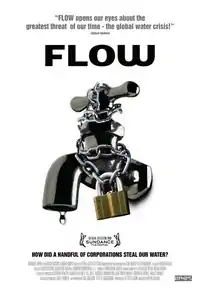Flow: For Love of Water
Flow: For Love of Water is a 2008 documentary film directed by Irena Salina produced by Steven Starr and co-produced by Gill Holland and Yvette Tomlinson . The film features interviews with water and community activists Maude Barlow, Peter Gleick, Ashok Gadgil, William Waterway, Rajendra Singh, and Vandana Shiva. The film won the Grand Jury Award at the Mumbai International Film Festival and the Grand Jury Award for Best Documentary at the United Nations Film Festival.
| Flow: For Love of Water | |
|---|---|
 | |
| Directed by | Irena Salina |
| Produced by | Steven Starr |
| Music by | Various Artists |
| Edited by | Caitlin Dixon Madeleine Gavin Andrew Mondshein |
| Distributed by | Oscilloscope Laboratories |
Release date |
|
Running time | 93 minutes |
| Country | United States |
| Language | English |
History
The film opens up and discusses the world water crisis. Nearly two million people die each year from water-borne diseases worldwide. The root causes of this crisis range from pesticide and chemical runoff, to simply not having access to clean water due to economic or political factors.
As of 2008, 70% of the world’s water was used for agricultural needs. With agricultural upkeep comes heavy pesticide and chemical use. As the land drains, these chemicals flow into the river systems and alter ecosystems. Atrazine and its health effects on mammals and amphibians is discussed briefly while mentioning its ban in the European Union, however, it is still used in the U.S.
The film also spends a lengthy amount of time on the topic of privatization of water infrastructure. Major businesses depicted in the film are Nestle, The Coca-Cola Company, Suez, and the International Monetary Fund (IMF). While tap water has gained a great stigma over the years, the FDA cannot confirm that bottled water is any safer. Tap water passes through water treatment plants and has to abide by set regulations, however, bottled water has less stringent regulations because there is no primary monitoring agency designated for the industry. Ethical dilemmas arise from the conversation of water privatization because water is a natural and common resource that companies are capturing for free to build a large profit. This constant pumping of water has changed the natural infrastructure of land and has caused water shortages in areas near pumping facilities. In 2008, the U.N. estimated that it would require funds of $30 billion a year to provide clean, accessible, drinking water to the entire planet while in the previous year, the world spent $90 billion on bottled water.
It competed in the Documentary Competition at the 2008 Sundance Film Festival.[1]
FLOW launched a Right To Water campaign to add a 31st article to the Universal Declaration Of Human Rights, Article31.org. FLOW was released theatrically by Oscilloscope Labs in September, 2008, and then invited to screen for the UN General Assembly on the 60th anniversary of the signing of the Universal Declaration of Human Rights, where the first 50,000 signatories to Article31 were presented to the President of the General Assembly, Father Miguel D'Escoto Brockmann. As of February 2016, the proposed article has upwards of 83,000 signatures.
Soundtrack
- A loop in time by Wally Brill
- Ganga Dev by Cheb i Sabbah,
- Ragam Tanam Pallavi by Shankar,
- River of Life by Christophe Julien
- Spiegel im spiegel by AG Vienna.
See also
- Water on the Table, a 2010 documentary on water privatization
References
- "2008 Sundance Film Festival Announces Films in Competition" (PDF). 2007-11-28. Archived from the original (PDF) on 2008-06-25. Retrieved 2008-01-07.